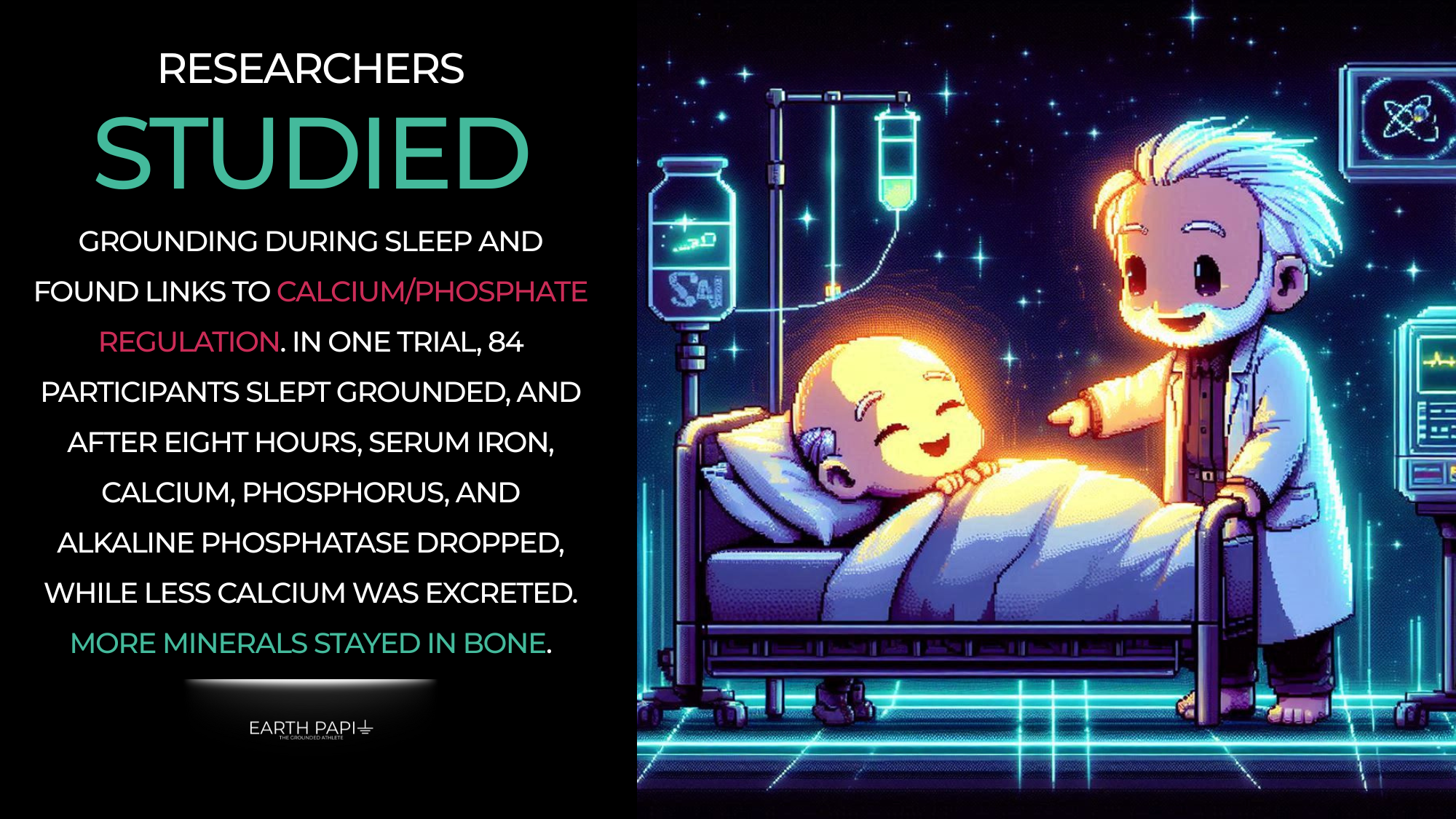Earth & Other, The Minis - Grounding and Mineral Balance
In the last article of The Minis, we talked about how grounding influences our thyroid hormones. Thyroid hormones like T3 and T4 govern vital metabolic and energy processes. They also influence bone growth, development, and remodeling. Excess thyroid hormone can accelerate bone breakdown which can elevate fracture risk. Insufficient thyroid hormone slows bone formation and compromises skeletal integrity. Proper thyroid function therefore has a direct bearing on mineral equilibrium and bone health. In this article we’ll quickly go over how grounding affects the mineral balance in our body which directly implicates skeletal health.
Research on grounding during sleep offer intriguing connections between the Earth and physiological processes that regulate calcium and phosphate. In one investigation, 84 individuals (30 women and 54 men) slept with a copper plate on the lower leg, connected through an insulated conductor to a second plate on moistened outdoor soil. Researchers used a double-blind method to compare grounded nights against non-grounded nights. They measured blood and urine samples for mineral levels before and after grounding from 10:00 pm to 6:00 am. Eight hours of grounding led to a decrease in serum iron, ionized calcium, total calcium, inorganic phosphorus, and alkaline phosphatase. Grounding also reduced renal excretion of calcium and phosphorus. This shift indicates that these minerals were being retained in bone instead of circulating at high levels or exiting the body.
Investigators noted a similar pattern in a separate sub-study that measured ionized calcium, total calcium, sodium, potassium, chloride, magnesium, and inorganic phosphorus over two days. One group experienced overnight grounding while another group did not. A shorter period of grounding produced measurable drops in serum ionized calcium, total calcium, inorganic phosphorus, and alkaline phosphatase. When grounding was briefly interrupted, total calcium and alkaline phosphatase rebounded, while ionized calcium and inorganic phosphorus decreased further. These findings point to a dynamic process where the Earth’s electrical contact can shift electrolyte balances and facilitate mineral storage in the skeleton.
Bone metabolism depends on balanced calcium and phosphate. This helps maintain structural integrity. By keeping these minerals in reserve, the skeleton stays strong and prepared for sudden demands. Osteoporosis arises when bone deteriorates faster than it rebuilds. This condition affects millions of people over age 50, including men and women across diverse backgrounds. Because calcium phosphate equilibrium also underpins muscle contraction, nerve function, clot formation, enzyme reactions, energy metabolism, and acid-base balance, any practice that supports stable mineral levels can have wide-ranging benefits.
Grounding has also been shown to lower serum iron concentrations. Iron is essential for oxygen transport and energy production, but excessive iron can create oxidative stress that raises disease risks. Regulating iron may help protect against harmful outcomes. These diverse mineral shifts hint at a larger pattern of physiological adjustment when the body is electrically connected to the Earth. The results so far suggest that sleeping grounded can influence how the body handles calcium, phosphate, and other electrolytes. This could help support skeletal strength by improving the distribution and retention of key minerals.
These observations point toward an important connection between grounding and bone maintenance. Proper mineral levels keep the body’s matrix strong. Reductions in urinary and serum levels of calcium and phosphorus indicate that these elements are being put to better use within the skeleton. Grounding’s effects on electrolyte concentrations add depth to our understanding of how simple physical contact with the Earth may help balance mineral pathways. This could be a promising approach for individuals concerned about osteoporosis or for anyone seeking to maintain robust bones and healthy mineral status.
Short one today, but very cool nonetheless. We’ll next discuss the final part of The Minis - Glucose Regulation.
As always, if you’re interested in learning more about grounding, check out Earth & Water.
Study:
Sokal K, Sokal P. Earthing the human body influences physiologic processes. J Altern Complement Med. 2011 Apr;17(4):301-8. doi: 10.1089/acm.2010.0687. Epub 2011 Apr 6. PMID: 21469913; PMCID: PMC3154031.












